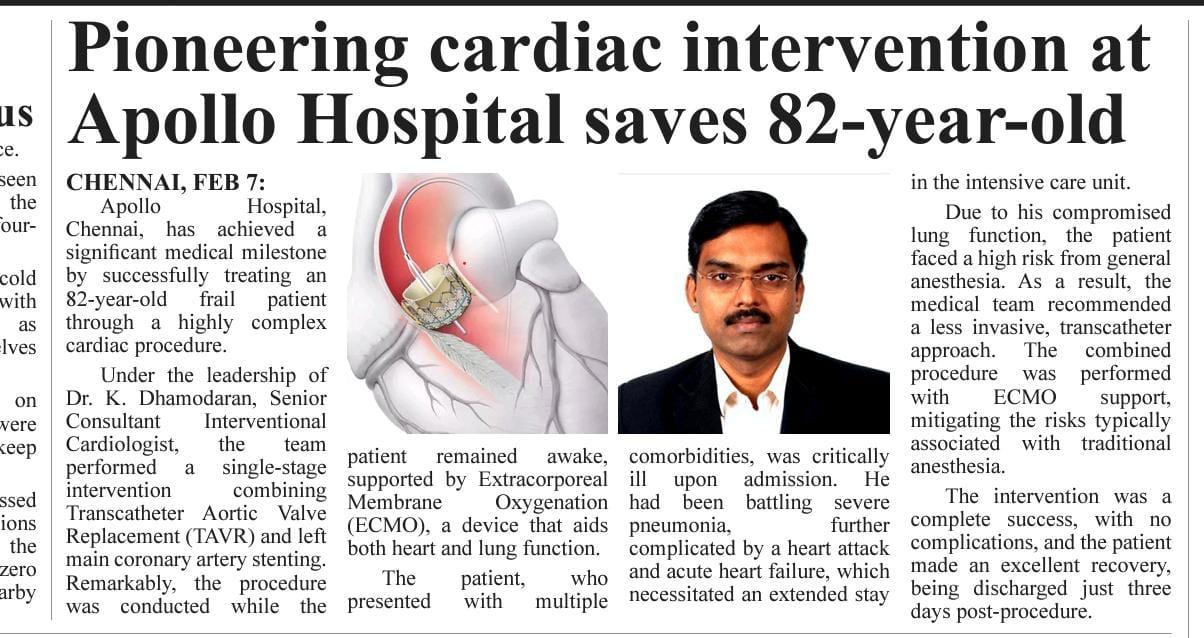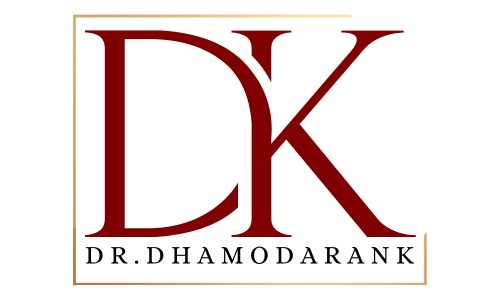 24 February, 2025
24 February, 2025
A Breakthrough in Cardiac Intervention: Apollo Hospital’s Life-Saving Procedure for an 82-Year-Old Patient
Introduction
In a remarkable medical achievement, Apollo Hospital, Chennai, has successfully performed a highly complex cardiac intervention that saved the life of an 82-year-old patient. The pioneering procedure, led by Dr. K. Dhamodaran, Senior Consultant Interventional Cardiologist, showcased a groundbreaking approach to treating high-risk elderly patients with severe heart conditions.
The patient, who was frail and battling multiple comorbidities, faced critical health challenges, including severe pneumonia, a recent heart attack, and acute heart failure. Traditional surgical interventions carried significant risks due to his compromised lung function. However, the expert team at Apollo Hospital executed a minimally invasive, single-stage procedure that combined Transcatheter Aortic Valve Replacement (TAVR) and left main coronary artery stenting, achieving a successful outcome.
This case marks a major milestone in the field of interventional cardiology, highlighting the importance of advanced medical techniques in treating complex cases.
Understanding the Patient’s Condition
The 82-year-old patient arrived at Apollo Hospital in a critical state. He was suffering from:
- Severe pneumonia, which affected his respiratory function.
- A recent heart attack, complicating his already fragile condition.
- Acute heart failure, requiring immediate and advanced medical intervention.
Given his frailty and the severity of his ailments, conventional open-heart surgery was not a viable option. The patient’s weakened lung function made general anesthesia particularly risky, necessitating an innovative and less invasive alternative.
The Innovative Cardiac Intervention
Recognizing the patient’s high-risk condition, the medical team devised a strategic plan that prioritized both efficacy and safety. Under the leadership of Dr. K. Dhamodaran, they performed a single-stage intervention that combined:
- Transcatheter Aortic Valve Replacement (TAVR): A minimally invasive procedure that replaces a narrowed aortic valve without open-heart surgery.
- Left Main Coronary Artery Stenting: A technique used to open blocked arteries and restore blood flow to the heart.
Use of ECMO for Added Support
One of the most remarkable aspects of this procedure was the use of Extracorporeal Membrane Oxygenation (ECMO). This advanced life-support system assisted both heart and lung function, ensuring the patient remained stable throughout the intervention. Unlike traditional surgeries that require general anesthesia, this procedure was conducted while the patient was awake, further reducing surgical risks.
Why This Procedure Was Groundbreaking
The successful completion of this procedure at Apollo Hospital represents a major advancement in cardiac care. Here’s why this case stands out:
- Minimally Invasive Approach: Traditional heart surgeries involve significant incisions and general anesthesia. However, this procedure leveraged transcatheter techniques, making it safer for elderly and high-risk patients.
- Use of ECMO: By incorporating ECMO, the medical team ensured that both the heart and lungs received adequate support, reducing complications.
- Awake Patient During Surgery: Conducting the procedure without general anesthesia significantly lowered the risks, given the patient’s compromised lung function.
- Fast Recovery Time: Despite the complexity of the intervention, the patient made an excellent recovery and was discharged just three days post-procedure.
The Future of Cardiac Interventions
This groundbreaking success at Apollo Hospital paves the way for more advanced cardiac treatments, particularly for elderly patients with severe comorbidities. The integration of TAVR, stenting, and ECMO support showcases the potential of interventional cardiology to provide safer, more effective solutions without the need for traditional open-heart surgery.
Key Takeaways from This Case:
- Minimally invasive cardiac procedures are revolutionizing treatment for high-risk patients.
- Advanced support systems like ECMO can mitigate the risks associated with anesthesia and surgery.
- A multidisciplinary approach ensures better outcomes for complex cardiac conditions.
Consultation Location

 +91 96001 07057
+91 96001 07057 Sidharam Heart Clinic Adyar, Gandhi Nagar, Canal Bank Road, Opp.St.Louis School, Adyar, Chennai, Tamil Nadu 600020
Sidharam Heart Clinic Adyar, Gandhi Nagar, Canal Bank Road, Opp.St.Louis School, Adyar, Chennai, Tamil Nadu 600020

